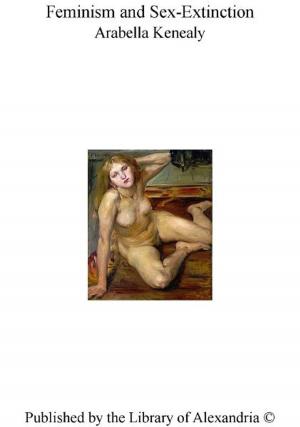The Mermaid: A Love Tale
Nonfiction, Religion & Spirituality, New Age, History, Fiction & Literature| Author: | Lily Dougall | ISBN: | 9781465624420 |
| Publisher: | Library of Alexandria | Publication: | March 8, 2015 |
| Imprint: | Language: | English |
| Author: | Lily Dougall |
| ISBN: | 9781465624420 |
| Publisher: | Library of Alexandria |
| Publication: | March 8, 2015 |
| Imprint: | |
| Language: | English |
Caius Simpson was the only son of a farmer who lived on the north-west coast of Prince Edward's Island. The farmer was very well-to-do, for he was a hard-working man, and his land produced richly. The father was a man of good understanding, and the son had been born with brains; there were traditions of education in the family, hence the name Caius; it was no plan of the elder man that his son should also be a farmer. The boy was first sent to learn in what was called an "Academy," a school in the largest town of the island. Caius loved his books, and became a youthful scholar. In the summer he did light work on the farm; the work was of a quiet, monotonous sort, for his parents were no friends to frivolity or excitement. Caius was strictly brought up. The method of his training was that which relies for strength of character chiefly upon the absence of temptation. The father was under the impression that he could, without any laborious effort and consideration, draw a line between good and evil, and keep his son on one side of it. He was not austere—but his view of righteousness was derived from puritan tradition. A boy, if kindly treated, usually begins early to approve the only teaching of which he has experience. As a youth, Caius heartily endorsed his father's views, and felt superior to all who were more lax. He had been born into that religious school which teaches that a man should think for himself on every question, provided that he arrives at a foregone conclusion. Caius, at the age of eighteen, had already done much reasoning on certain subjects, and proved his work by observing that his conclusions tallied with set models. As a result, he was, if not a reasonable being, a reasoning and a moral one. We have ceased to draw a distinction between Nature and the forces of education. It is a great problem why Nature sets so many young people in the world who are apparently unfitted for the battle of life, and certainly have no power to excel in any direction. The subjective religion which Caius had been taught had nourished within him great store of noble sentiment and high desire, but it had deprived him of that rounded knowledge of actual life which alone, it would appear, teaches how to guide these forces into the more useful channels. Then as to capacity, he had the fine sensibilities of a poet, the facile introspection of the philosophical cast of mind, without the mental power to write good verse or to be a philosopher. He had, at least in youth, the conscience of a saint without the courage and endurance which appear necessary to heroism. In mockery the quality of ambition was bestowed upon him but not the requisites for success. Nature has been working for millions of years to produce just such characters as Caius Simpson, and, character being rather too costly a production to throw away, no doubt she has a precise use for every one of them. It is not the province of art to solve problems, but to depict them. It is enough for the purpose of telling his story that a man has been endowed with capacity to suffer and rejoice.
Caius Simpson was the only son of a farmer who lived on the north-west coast of Prince Edward's Island. The farmer was very well-to-do, for he was a hard-working man, and his land produced richly. The father was a man of good understanding, and the son had been born with brains; there were traditions of education in the family, hence the name Caius; it was no plan of the elder man that his son should also be a farmer. The boy was first sent to learn in what was called an "Academy," a school in the largest town of the island. Caius loved his books, and became a youthful scholar. In the summer he did light work on the farm; the work was of a quiet, monotonous sort, for his parents were no friends to frivolity or excitement. Caius was strictly brought up. The method of his training was that which relies for strength of character chiefly upon the absence of temptation. The father was under the impression that he could, without any laborious effort and consideration, draw a line between good and evil, and keep his son on one side of it. He was not austere—but his view of righteousness was derived from puritan tradition. A boy, if kindly treated, usually begins early to approve the only teaching of which he has experience. As a youth, Caius heartily endorsed his father's views, and felt superior to all who were more lax. He had been born into that religious school which teaches that a man should think for himself on every question, provided that he arrives at a foregone conclusion. Caius, at the age of eighteen, had already done much reasoning on certain subjects, and proved his work by observing that his conclusions tallied with set models. As a result, he was, if not a reasonable being, a reasoning and a moral one. We have ceased to draw a distinction between Nature and the forces of education. It is a great problem why Nature sets so many young people in the world who are apparently unfitted for the battle of life, and certainly have no power to excel in any direction. The subjective religion which Caius had been taught had nourished within him great store of noble sentiment and high desire, but it had deprived him of that rounded knowledge of actual life which alone, it would appear, teaches how to guide these forces into the more useful channels. Then as to capacity, he had the fine sensibilities of a poet, the facile introspection of the philosophical cast of mind, without the mental power to write good verse or to be a philosopher. He had, at least in youth, the conscience of a saint without the courage and endurance which appear necessary to heroism. In mockery the quality of ambition was bestowed upon him but not the requisites for success. Nature has been working for millions of years to produce just such characters as Caius Simpson, and, character being rather too costly a production to throw away, no doubt she has a precise use for every one of them. It is not the province of art to solve problems, but to depict them. It is enough for the purpose of telling his story that a man has been endowed with capacity to suffer and rejoice.















